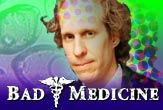Colon Cleansing: Money Down the Toilet

Get the world’s most fascinating discoveries delivered straight to your inbox.
You are now subscribed
Your newsletter sign-up was successful
Want to add more newsletters?

Delivered Daily
Daily Newsletter
Sign up for the latest discoveries, groundbreaking research and fascinating breakthroughs that impact you and the wider world direct to your inbox.

Once a week
Life's Little Mysteries
Feed your curiosity with an exclusive mystery every week, solved with science and delivered direct to your inbox before it's seen anywhere else.

Once a week
How It Works
Sign up to our free science & technology newsletter for your weekly fix of fascinating articles, quick quizzes, amazing images, and more

Delivered daily
Space.com Newsletter
Breaking space news, the latest updates on rocket launches, skywatching events and more!

Once a month
Watch This Space
Sign up to our monthly entertainment newsletter to keep up with all our coverage of the latest sci-fi and space movies, tv shows, games and books.

Once a week
Night Sky This Week
Discover this week's must-see night sky events, moon phases, and stunning astrophotos. Sign up for our skywatching newsletter and explore the universe with us!
Join the club
Get full access to premium articles, exclusive features and a growing list of member rewards.
Unlike many natural therapies, colon cleansing makes a lot of sense. It is expensive, utterly useless and potentially harmful, but it's all even more logical if one subscribes to the body-as-a-sewer-system paradigm.
Now, I'll be talking about feces, so this column is not for the squeamish or those eating lunch.
First, a little basic biology. The colon, also called the large intestine and myriad slang names not repeatable here, follows the small intestine and comprises the end of the gastrointestinal tract. Most nutrients from food are absorbed in the small intestine. The colon absorbs water and salts from the stool while it pushes it along through the rectum, which excretes it.
Laxatives and enemas, which promote bowel movements, have been around for at least 4,000 years and were famously practiced by the ancient Egyptians. That shouldn't be an endorsement; the ancient Egyptians also buried servants alive to attend to the mummified kings in the afterlife. Colon cleansing refers to a more invasive procedure of water and hoses stuck you-know-where. It's not clear when this practice started.
Your inner sewage system
The golden age of the colon in America was in the late 19th century when—perhaps influenced by a new emphasis on hygiene and proper sewage removal—serious-minded doctors developed the theory of colonic autointoxication.
| Bad Medicine |
| Bad Medicine appears each Tuesday on LiveScience. Other naturally bad ideas: |
The idea was that the intestines were a sewage system and that constipation, although never specifically defined, resulted in a cesspool within the body where food wastes would putrefy, become toxic, and get reabsorbed through the intestines. Some scientists also claimed that constipation caused fecal matter to harden onto the intestinal walls for months or years, blocking the absorption of nutrients (yet somehow not blocking toxins).
Get the world’s most fascinating discoveries delivered straight to your inbox.
John Harvey Kellogg was a leading advocate for the theory of autointoxication and, the legend goes, manufactured whole-grain cereals to promote regular bowel movements. (It was his brother, Will, who founded the Battle Creek Toasted Corn Flake Company, which later became the Kellogg Company.)
It all made perfect sense. But it was wrong.
Constipation is indeed uncomfortable. But careful testing found that those symptoms associated with it and attributed to autointoxication—headache, fatigue, loss of appetite and irritability—were not a result of toxins but rather the colon expanding. The reason was mechanical, not chemical.
Quackery makes a comeback
The beginning of the end of the (first) era of autointoxication came with a 1919 article in Journal of the American Medical Association by W.C. Alvarez, "Origin of the so-called auto-intoxication symptom."
Soon after, and still to this day, direct observations of the colon through surgery and autopsy find no hardening of fecal matter along the intestinal walls. There's no cesspool either. Cesspools form from copious amounts of feces from entire neighborhoods, which is why crowded cities with inadequate sewage systems smelled so awful and why autointoxication made sense.
By the 1920s, colon cleansing was relegated to the realm of quackery. But, in this modern American life of comforts our ancestors could never imagine, you can't keep a crappy idea down.
Autointoxication makes sense today to those people who, for whatever reasons, believe that modern food is filled with toxins and that the pharmaceutical industry wants us to be constipated so that they can make billions of dollars unclogging us with harmful chemicals.
Those who advocate colon cleansing today present the exact same arguments as scientists did more than 100 years ago. Not surprisingly, they're still wrong. Their reasoning is spelled out on thousands of web sites that give no references to their claims that colon cleansing cures everything from arthritis to Zollinger-Ellison syndrome. Inevitably these sites include testimonials, then the opportunity to buy the cure.
"It's all just nonsense," says Dr. Brian Lacy of Dartmouth Medical School, author of Making Sense of IBS: A Physician Answers Your Questions about Irritable Bowel Syndrome. With prices often topping $100 and sometimes reaching $1,000 for weeklong spa therapies, Lacy calls colon cleansing "a very expensive enema."
Listen to logic
Lacy approaches the topic logically. If stool is toxic, then the roughly 15 percent of American adults with constipation would have higher rates of colon or digestive diseases. They don't.
There have been real, honest-to-goodness studies on colon cleansing in recent years, he said, but they all have focused on the potential harm: abscesses caused by too much water, rectal perforation and electrolyte imbalance. All that water, usually tens of gallons, washes out the electrolytes that the colon was built to absorb. The water also washes away beneficial bacteria needed for digestion, and not magically only harmful bacteria, as the proponents claim.
Being regular can mean hitting the toilet three times a day or three times a week; there is zero evidence that more bowel movements will make you healthier. If you are constipated, then a laxative can make you feel better. Laxatives also aren't necessarily healthy. There are kinds that shock the bowels into moving, kinds that draw water into the intestines, and kinds that build bulk. Many doctors, particularly naturopaths, recommend the bulk-builders.
While colon cleaning can make some people feel better, it doesn't cure any disease; it's no more effective at relieving discomfort than an enema; and it is tantamount to throwing money down the proverbial toilet.
Christopher Wanjek is the author of the books “Bad Medicine” and “Food At Work.” Got a question about Bad Medicine? Email Wanjek. If it’s really bad, he just might answer it in a future column. Bad Medicine appears each Tuesday on LIveScience.
Related Stories
- Top 10 Mysterious Diseases
- The Most Popular Myths in Science
- Licensing Naturopaths May Be Hazardous to Your Health
- Body Quiz: What the Parts Do
- Body Quiz: How the Parts Fit
- Body Quiz: The Parts List
More Bad Medicine

Christopher Wanjek is a Live Science contributor and a health and science writer. He is the author of three science books: Spacefarers (2020), Food at Work (2005) and Bad Medicine (2003). His "Food at Work" book and project, concerning workers' health, safety and productivity, was commissioned by the U.N.'s International Labor Organization. For Live Science, Christopher covers public health, nutrition and biology, and he has written extensively for The Washington Post and Sky & Telescope among others, as well as for the NASA Goddard Space Flight Center, where he was a senior writer. Christopher holds a Master of Health degree from Harvard School of Public Health and a degree in journalism from Temple University.
 Live Science Plus
Live Science Plus










